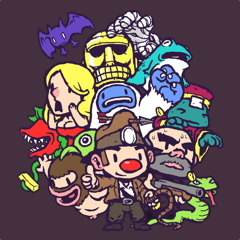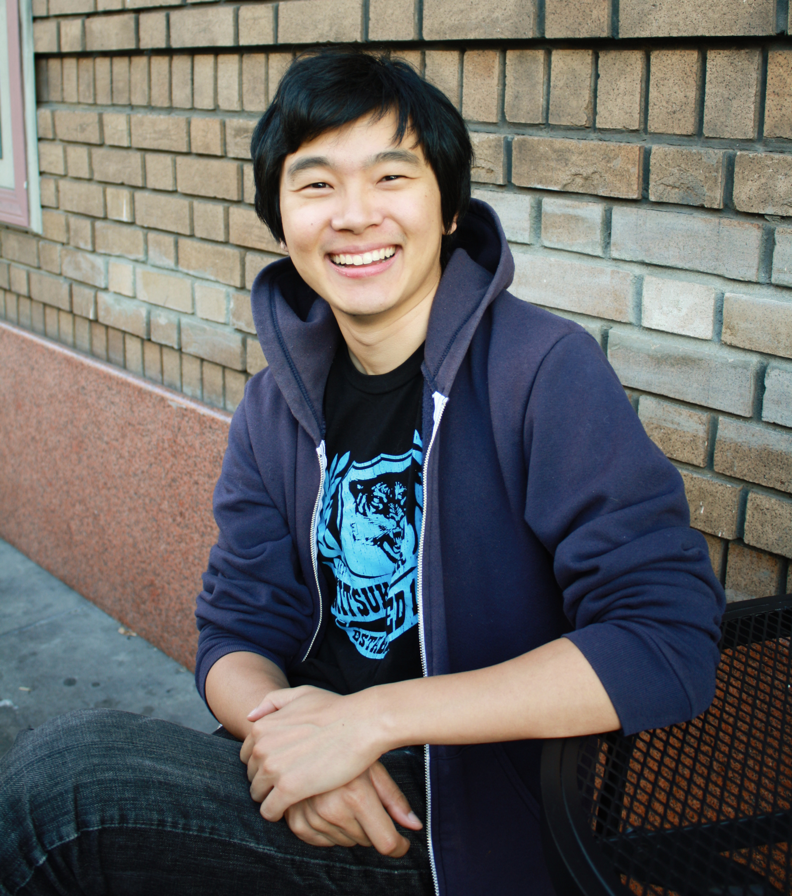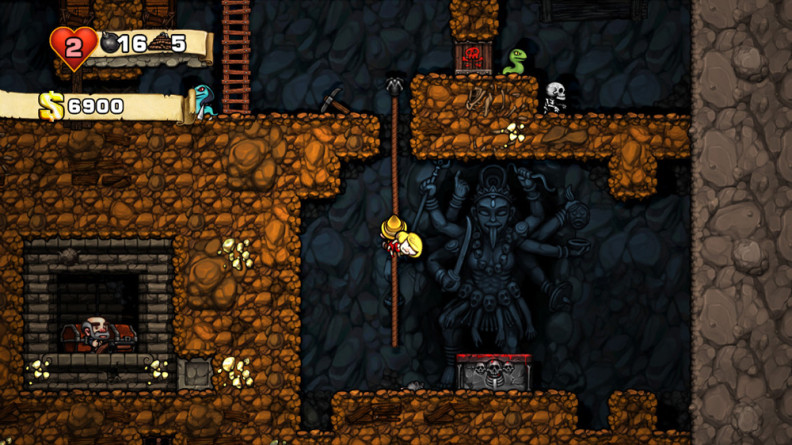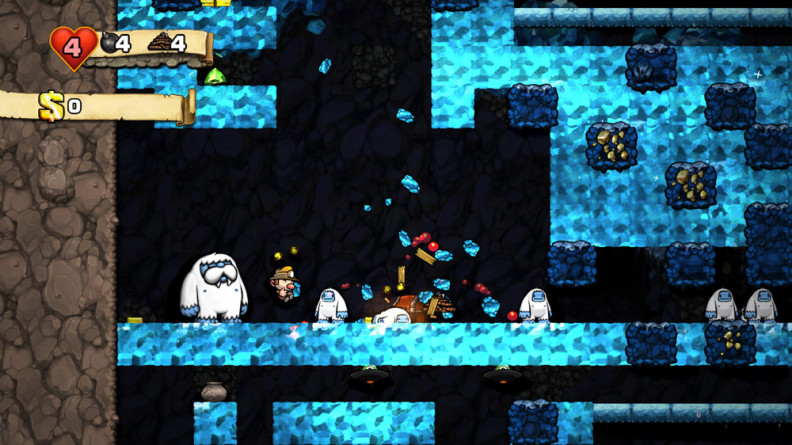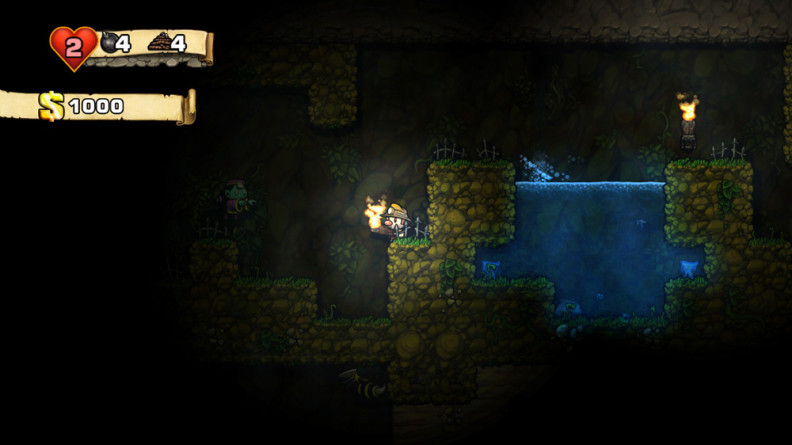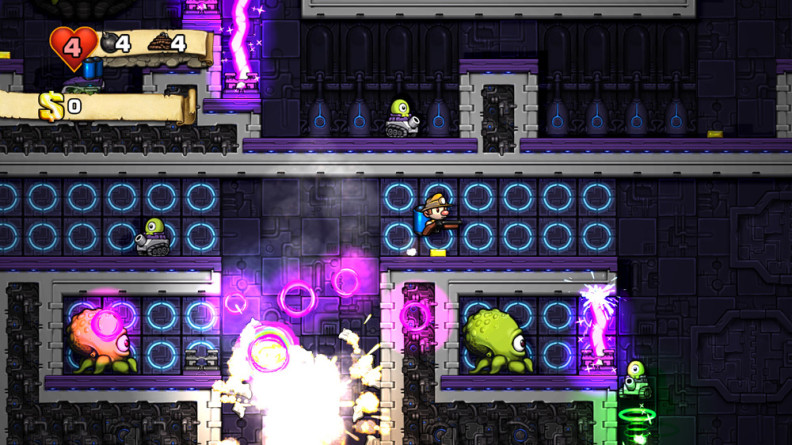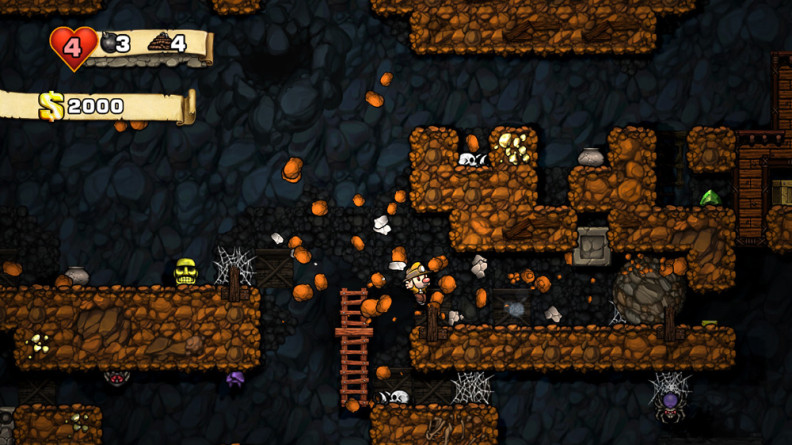My interview with Spelunky’s Derek Yu
In the summer of 2012, my favorite game by far was Spelunky on Xbox 360. An unassuming platformer with random levels and permadeath, that turned out to be extremely well-made, and filled to the brim with surprises. The game was developed by Mossmouth, Derek Yu’s tiny studio. Then, when the game appeared on the PlayStation platforms and Steam in the summer of 2013, I got the chance to hear out Yu about his creation, the process behind it, and his ambitions for the future.
Most of the interview was published earlier, in two parts. The majority of Yu’s comments on Spelunky and Sony appeared in the Dutch Official PlayStation Magazine, while the majority of Yu’s comments on game making in general appeared in the Dutch daily newspaper nrc.next. This is the first time the (very lightly edited) conversation appears in full, and in English.
When and why did you decide you wanted to make games?
“I started designing games as soon as I was old enough to play them. Before I could make games on the computer, I would design them on paper. My parents have many pads of paper covered with drawings of monsters, heroes, and levels.”
So what’s the draw? Why was (and is) making games so irresistible for you?
“It’s being able to create a living world, and also the combination of visual arts, music, mechanical systems, and interactivity. Video games fulfill every need a creative person might have. And I’m very needy!”
Did you ever try to work for a big studio?
“I never did. I’ve been making games independently my whole life and the thought of suddenly becoming a small part of a large entity has never appealed to me at all. In fact, the only time when I’ve truly felt like giving up on a career as a game developer was when it seemed that joining a big studio was the only way to move forward. Thankfully, the independent scene made it possible for me to make a living without compromising my way of developing games.”
Do you see yourself staying independent forever?
“I can’t imagine giving up the freedom I have. It’s hard at times, but I absolutely love my life and feel very fortunate to be where I am. I don’t feel like I have to compromise, which is great.”
Do you have the ambition to build a larger company?
“Of course I also have ambitions to make larger and more involved games. But honestly, I don’t believe that I’ll need a huge team to make the games I have in mind. It’s amazing what you can do with the right people and the right way of thinking. In the future, I’d like to increase my core team size from three people to maybe… six?”
What’s the hardest part about being independent?
“The hardest part for me is that I have to do so much myself. But it’s also what makes it the most gratifying.”
What do you mean when you say you want to make ‘more involved’ games?
“I’d love to make games that get even deeper in terms of what the player can experience and discover.”
And what about ’the right way of thinking’ in game development? Are you talking about things like randomizing level design?
“I mean more like cutting out waste in the development process and in the games themselves by using everyone and everything to its utmost.”
You seem to be a skilled programmer, artist and writer. Which of these skills is closest to your heart?
“Well, drawing is my first love and my strongest skill, I would say. I’m a decent writer, but only because I spend a lot of time at it. As a programmer, I think you’re being unfairly generous to say that I’m skilled… in that arena I’m as mediocre as they come, but that’s enough to get me by, especially with tools like Game Maker and Unity available these days.”
I saw on your blog that you’re toying with 3D modeling. How serious are you with 3D? Do you want to use it in your next project?
“I’m planning on being pretty serious with 3D, although I’m not sure if it will make it into my next game. It depends on how quickly I can improve my skills there.”
Do you ever wonder whether you should specialize more?
“Sometimes I do think about this, but in the end I enjoy all of these activities and should probably admit that my true strength may lie in being ‘good enough’ at them all.”
Are we forgetting the hard-to-define role of the game designer? Isn’t that where you really shine?
“I’m not sure about that. But one thing I try to do, that I think is good, is to treat video games as long-lasting works of art as opposed to something disposable. If you respect games and you respect your players as much as possible, you’ll be able to speak to people long into the future. That’s my goal, at least.”
I first got to know you through your tutorials on pixel art and on Game Maker. Why do you teach other people your (surely valuable) tricks?
“In a way, writing tutorials for me is like making games… I want to create something that gives someone a positive experience and inspires them. I’m in a unique position to help in that way, so when I succeed, I feel like I’ve fulfilled my role in the universe or something like that. In any case, I believe that tricks are not meant to be hidden away, but to be shared. Ultimately, it’s hard work that is the most valuable. The tricks just make it a little bit easier.”
Where did the idea for Spelunky come from?
“The idea came from working on and playing platformers and roguelikes at the same time. Eventually, it occurred to me that the two might be compatible with one another.”
Do you recall a specific moment during development, where everything suddenly clicked? Or was it a matter of polishing and polishing more?
“I don’t recall a specific moment. It was one of those cases where it felt like the creation was creating itself… at every step of the development it seemed like I had the next piece of the puzzle already in my hand. I was lucky!”
Spelunky fits in with the trend of uncompromising games that don’t ‘handhold’ much. Why did you want to make such a game?
“Handholding takes away so much of what we love about games. The challenge, the mystery, the creativity of playing. It takes away your frustration, yes, but frustration is intimately connected to satisfaction. By taking away frustration you’re taking away meaning in many games. Suddenly, a fun activity becomes a chore. And there’s just no way that I’d want to make a game that feels like a chore to play!”
The way I see it, handholding exists because large game companies want to reach broader audiences with their expensive productions. Indie creators like you are responding to this by not only skipping the handholding, but also by making their games harder, sometimes ridiculously so. Do you see this trend, too?
“Sure, I see a counter-trend… but it’s just a natural reaction to bad ideas, in my opinion, and so you’ll see it coming from big companies as well as small. But the big companies have more to lose by alienating the broader audience, which is one reason why it might seem rarer at the ‘AAA’ level.
“I really do feel that the handholding is fundamentally bad. It makes people less involved, less immersed and, ultimately, bored. There’s no need for every game (or even most games) to treat people that way.”
I’m sure you sometimes run into people who feel Spelunky is just way too hard, though. What do you say to them?
“I’d say, ‘Try to enjoy the process of exploring and figuring out the game. Be patient. Take breaks. Treat it like a 16-course meal rather than a snack. Basically, savor the experience. Before you know it, you’ll have done something you didn’t think was possible!'”
How do you start a game concept? Is it all in your head? Do you write a plan? Do you draw it? Do you create quick prototypes in Game Maker?
“For me, making a game is like taking a bunch of body parts I’ve already dug up and assembling them into a Frankenstein’s monster. All of my games have elements of unfinished past projects combined with new ideas I’ve been developing in my head. So I never sit down at a computer cold… there’s always a big, messy pile of pieces to work with, old and new. The hard part is figuring out which pieces connect and how best to fit them. That’s where all the things you mentioned come into play: drawing, writing, prototyping. It’s a big puzzle.”
In a GDC talk two years ago, you spoke about making prototypes before doing big projects. Yet I mostly associate you with spending four years on one game (between Spelunky Classic and the Xbox Live Arcade remake). Do you just not release your prototypes for a general audience?
“The original Spelunky was a finished little game that arose out of various unfinished prototypes that eventually turned into a finished big game. So no, those prototypes never made it out there. That’s probably the case for most developers.”
Are you interested in releasing more ‘rough draft’ work to the public, and doing a paid alpha kind of project someday?
“I’m not particularly interested in it. I like to put out games when I feel that they’re ready. But you never know!”
How can you spend so much time on what appears to be a simple game?
“Looks can be deceiving when it comes to how simple a game is!”
Maybe I should put it differently: could you describe what a working day in, let’s say, the last year of Spelunky for Xbox looked like?
“An average day consisted of waking up, starting a video chat with Andy Hull, the lead programmer, and then working on the game until I went to sleep, pretty much. You do it by taking things one step at a time and also by enjoying your work a lot. Not that everything I did for Spelunky was ‘fun’. Far from it, actually. But it was always very satisfying to see the game come together, and my previous experiences had told me that the release would be worth it.”
Can you give an example of something that may go unnoticed, that you spent a lot of work on?
“Well… occasionally a village of cavemen will appear in the jungle. I spent quite a while designing little dwellings that appear in the village, using mostly existing assets from other areas of the game. One dwelling in particular has a fireplace with a cauldron in it. I ended up putting a lit torch under the cauldron to make it look as though it were cooking. A minuscule but fun detail, I thought.
“This was something I focused on for a day or so without thinking much about Spelunky as a whole. Hopefully players will come across that scene and be able to tell that I enjoyed myself with it… before moving on to more important matters, like winning the game.”
Richard Boeser, the creator of ibb & obb, is a first-time game maker. He told me he was surprised and somewhat appalled by how much time level design can take. He was eager to get rid of it for his next project and do something procedural/randomized like you did. Can you see yourself creating a game with handmade levels again?
“Making a game with randomized levels is certainly a lot of fun, but I’m also looking forward to building handmade levels again. Perhaps it’s a matter of ’the grass is always greener’. Randomized levels require less precision and offer more surprises to the designer, but they lack the elegance of completely handmade levels.”
Is there anything in Spelunky you’re not entirely happy with, even after all those years? And what aspect are you proudest of?
“I’m mostly very proud of the game. I think most of my criticisms of it are small cosmetic details or lingering bugs.”
What was the hardest thing to do?
“The hardest thing to do was animate each of the player characters, because they had hundreds of frames of animation each and it was repetitive work.”
And the most fun?
“The most fun was probably designing all of the little graphical details that went into each level, like the wooden tiles that appear in the Mines. Just doing one piece like that added so much variety to the way the levels looked, and it was very enjoyable to watch them make their way into the random generation. I also had a great time testing multiplayer with Andy!”
How do you feel about Spelunky’s reception? Did it surpass your expectations?
“I was very happy with how it was received. Creators that I respect a lot seemed to enjoy the game and appreciate its nuances, and I heard many heartwarming stories about people playing it with their family and friends, many of whom were not hardcore game players. I don’t know exactly what I expected, but the results certainly seemed to surpass it.”
What surprised you the most?
“I was maybe most surprised that players did not seem to take to the Deathmatch Mode the way Andy and I did during the development. Many saw it as a much smaller and more chaotic aspect of the game than we had planned. I’m not sure why. Maybe there’s a learning curve there that hasn’t been overcome.”
Were you talking with Sony before the Xbox version came out, or was it triggered by its success? What was it like to work with them?
“Sony contacted us after the Xbox Live Arcade version came out. It’s been great to work with them. They’re extremely proactive about helping and promoting indie developers. It’s unfortunate that Microsoft as a whole seems to care less about indies, because they have some great people working for them. I hope they take a cue from Sony on that front.”
Another studio is making Spelunky for PlayStation 3 and PlayStation Vita. Why not do it yourself?
“We have no experience making PlayStation games and, to be honest, we don’t have the motivation to do the port ourselves. When the opportunity came up to work with Blitworks, we jumped on it. They’re extremely talented.”
Will anything be added/substracted/changed for that version?
“The basic content will be the same, but we’re using as many features on PlayStation 3 and Vita as we can. For example, you’ll be able to play multiplayer against other players on PlayStation 3 or Vita using Cross Play.”
So… what’s the next game?
“I’m not sure yet!”
If there were no boundaries at all, including time, technology and money, what game would you make?
“I’d make a game with a lot of boundaries…”

